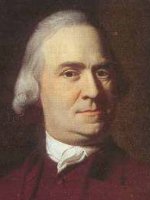 In 1769, Scottish-born printer John Mein issued a pamphlet that assailed the leaders of the Boston Whigs by referring to them with nicknames that were, let's say, unflattering: "Johny Dupe, Esq.," "Deacon Clodpate," "William the Knave," "Muddlehead," and so on. Obviously, this was political invective, and therefore we have to treat it cautiously as a historical source. But one of Mein's political insults has been adopted and repeated by many twentieth-century writers: Mein referred to Samuel Adams as "Samuel the Publican."
In 1769, Scottish-born printer John Mein issued a pamphlet that assailed the leaders of the Boston Whigs by referring to them with nicknames that were, let's say, unflattering: "Johny Dupe, Esq.," "Deacon Clodpate," "William the Knave," "Muddlehead," and so on. Obviously, this was political invective, and therefore we have to treat it cautiously as a historical source. But one of Mein's political insults has been adopted and repeated by many twentieth-century writers: Mein referred to Samuel Adams as "Samuel the Publican."In his 1936 biography Sam Adams: Pioneer in Propaganda, John C. Miller picked up on that phrase and wrote:
Sam Adams discovered these taverns with their "tippling, nasty, vicious crew" excellent recruiting grounds for the mobs he later raised against the Tories and Crown officers. Adams himself was a familiar figure in Boston taverns; one of his choice nicknames among the Tories was "Sam the Publican."(I'm not sure where the "tippling, nasty, vicious crew" quote comes from, but obviously not from Samuel Adams; calling folks that is no way to win friends and influence people, especially if they've been tippling.) Miller's portrait of Adams—part psychoanalytic, part political, mostly negative—helped to determine the popular image of the man for the rest of the twentieth century.
But there's a big problem with Miller's claim that Adams "was a familiar figure in Boston taverns": his only evidence for that remark is the "Publican" nickname, which in all likelihood meant something different from what Miller thought. The word "publican" has two meanings, as Merriam-Webster's and other dictionaries show:
- tavernkeeper (deriving from another name for such an establishment, a "public house")
- tax collector, particularly a citizen who contracts with the government to collect taxes in exchange for a fraction of the revenue (this meaning of the word is the older one, from the Latin publicanus)
John Mein obviously wanted to say the worst about his political enemies, and Adams's most vulnerable spot was his big outstanding debt to the government. Other political writers brought up that issue as well. In April 1775, for example, a friend of the royal government annotated a list of Patriots appointed to enforce the Continental Congress's boycott on British goods. Beside Adams's name that person wrote:
Formerly a collector of taxes and largely in debt to the Town of Boston. The principal spring and manager of plots and conspiracies against the State;—famous for smoking bacon and always shudders at the sight of hemp.Nothing about taverns, but a clear reference to the tax debt. (As well as an unclear reference to bacon. The hemp remark probably meant Adams should worry about being hanged.)
Thus, in the context of 1769 "Samuel the Publican" didn't mean, "Samuel who hangs around in taverns"; it meant "Samuel the tax-collector who still owes Boston money." Which leaves little evidence for Miller's portrait of Adams as "a familiar figure in Boston taverns."
TOMORROW: So where did Samuel Adams find young recruits for the Whig party?
A little near-contemporaneous confirmation for my reading of Samuel Adams’s nickname from John Eliot’s A Biographical Dictionary, Containing a Brief Account of the First Settlers, and Other Eminent Characters...in New-England, published in 1809: Adams’s “first office in the town was that of tax gatherer; which the opposite party in politicks often alluded to, and in their controversies would style him Samuel the Publican.”
ReplyDeleteSeveral comments:
ReplyDeleteAnother interesting aspect of John Miller's use of the Mein quote is that he changes "Samuel the Publican" to "Sam the Publican". Miller seemed particularly intent on making Samuel into "Sam", a nickname apparently not often used to describe Adams in his lifetime.
Thanks to the magic of Google Book Search, I can relate that the quote "tippling, nasty, vicious crew" comes from John Adams's diary, where he describes pub denizens as such.
This post is cited in a footnote in Ira Stoll's new biography of Samuel Adams, where Stoll points out the probable meaning of "Sam the Publican", Good work!
Yes, one hallmark of the portrayal of Samuel Adams as an inveterate troublemaker is referring to him as “Sam.” Most of his contemporaries, especially his colleagues, referred to him as “Samuel.” However, every so often one does see a “Sam Adams,” as in the Rev. William Gordon’s letter to John Adams, 19 Oct 1780.
ReplyDeleteThanks for finding the “tippling, nasty, vicious” phrase. John Adams was never as happy with popular politics as his cousin.
And thanks also for the word about the footnote in Ira Stoll’s book. I just got a copy this week, and am looking forward to sampling it. It’s great to know this little entry has had its intended effect.